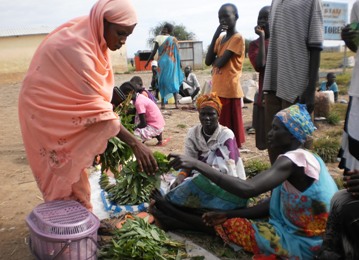Unity state food prices up by over 70% after border shooting
November 26, 2013 (BENTIU) – Food commodities have skyrocketed in Unity state after a border crossing between South Sudan and Sudan was closed following the killing of eight Sudanese traders on the border over a week ago.

The price of 50kg of sugar in the Unity state capital, Bentiu, increased from 280 South Sudanese pounds to 360 SSP and maize flours increased from before 180SSP and gone up to 250 SSP.
Sudanese traders say it now takes them four to five days to reach Unity state from South Kordofan since the official border crossing point from Abiemhnom county was closed.
The Unity state government says it has deploying more security personnel along the borders for to provide protection for traders.
Juoy Geng Gatluak, the head of traders in Bentiu town, says it has been difficult for merchants or traders find alternative supply routes such as from the South Sudanese capital Juba. Most traders take the security and financial risk of transporting the goods from Juba along the White Nile river, which can take two weeks, he said.
Traders have been forced to transport their goods by barge since “all roads connecting us from Bhar el Gazal through Mayom and the road from Lake state through Mayiandit were blocked”, he said, admitting that his leads to delays and price rises.
Heavy floods have left many roads in and out of Unity state impassable.
Gatluak says traders are cooperating order to standardise and reduce prices but needs the government to reopen the roads connecting Unity state to Juba.
Last week the price of 20 litres of diesel cost around 200 South Sudanese pounds but Gatluak said this could reduce to 150 SSP if the connections are reopened.
Abdelgazi Hamed, a Sudanese trader doing business in Bentiu town, used to import goods such as sugar, maize flour and oil from Uganda through Juba but says this is being hindered by the state of the roads.
After the rains the roads are “impassable” he said, adding that “if these are cleared I am sure the price will drop”.
Hamed expressed concern about the safety of Sudanese traders working in South Sudan but said that the two nations needed to continue to cooperate for the benefit of their people.
Traders must move freely and should not be the victims along the two countries borders.
“What I would like to urge on the two government to do is to put their interest on the benefits of both citizens, the traders should move freely and interacts doing business between each others because the traders represent the identity of citizens and if the two agree to open their common border everything would improve for trading”, said Hamed.
South Sudan, which seceded from Sudan in 2011, is a landlocked country and depend on its northern neighbour to transport its crude oil through its pipelines and refineries to reach international markets.
The border has been closed for most of South Sudan’s independence but relations improved this year leading to many border points being opened, making it easier for traders to import goods from north of the border.
(ST)
